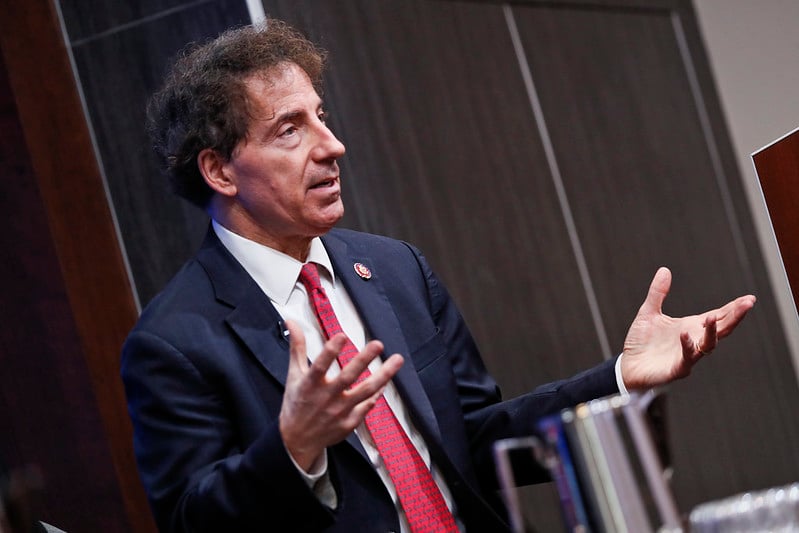In a recent interview when asked about Republican criticism of Texas Democrat Gene Wu, Rep. Jasmine Crockett (D-TX) claimed the GOP has embraced open bigotry since Donald Trump entered politics. She accused Republicans of coddling extremists and targeting minorities, saying it makes it hard for nonwhite voters to take them seriously.
Key Facts:
- MSNBC host Ali Velshi brought up GOP criticism of Texas Democrat Gene Wu, including claims of ties to the Chinese Communist Party.
- Rep. Jasmine Crockett accused Republicans of becoming openly racist ever since Donald Trump took office the second time.
- Crockett alleged the GOP “consistently coddles” neo-Nazis and uplifts groups like the Proud Boys.
- She tied January 6 rioters to extremist organizations and accused the GOP of placing them in roles at ICE.
The Rest of The Story:
The exchange began when MSNBC’s Ali Velshi mentioned that some Republicans had accused Texas state Rep. Gene Wu, an Asian-American Democrat, of ties to the Chinese Communist Party. Velshi described this as an example of racism that was no longer being hidden.
Rep. Jasmine Crockett agreed, claiming that Trump’s rise to power encouraged Republicans to shed any pretense of subtlety about racism.
She said that after Trump’s first term, “the hoods were off,” likening the change to the removal of Klan masks.
Crockett described herself as “perfectly fine” with such openness, saying it made it easier to identify “despicable” people. She accused Republicans of hypocrisy, claiming they act immorally while promoting Christianity.
She went on to say that Republicans habitually “coddle” neo-Nazis and elevate groups such as the Proud Boys.
According to Crockett, many January 6 participants were tied to extremist movements, and some are now “qualified” in the GOP’s eyes to work in immigration enforcement, which she described as “terrorizing” minority communities.
Commentary:
Crockett’s remarks are a prime example of overblown political theater aimed at smearing the GOP with the broadest brush possible. By invoking imagery of the Ku Klux Klan and accusing Republicans en masse of racism, she sidesteps any real discussion of policy or governance.
The reality is that under President Trump, the Republican Party is more diverse in leadership and representation than it has been in decades.
Cabinet members, judges, and high-profile officials included individuals from across racial and ethnic backgrounds — chosen for merit, not tokenism.
This stands in contrast to the Democratic Party’s increasingly performative identity politics, which often celebrates surface-level diversity while pushing divisive narratives.
The GOP’s record also defies Crockett’s insinuation that it is driven by bigotry.
Republicans have fought for school choice to benefit disadvantaged communities, defended the rights of religious minorities, and opposed racial discrimination in college admissions — even when that means protecting Asian-American students from unfair treatment.
Meanwhile, the modern Democratic Party has taken positions openly hostile to large swaths of Americans — including white working-class voters, Christians, and even Jewish communities in the wake of rising antisemitism on the left.
This is not inclusion; it’s selective acceptance based on political alignment.
What Crockett truly fears may not be “neo-Nazis in the GOP,” but the erosion of her own political standing.
Districts are shifting, voters are rethinking loyalty, and her brand of race-charged rhetoric is losing traction.
Even within her own party, frustration with politicians who focus on inflammatory accusations over tangible results is growing.
If the choice is between endless culture-war soundbites and effective governance, more voters — even Democrats — might be ready to say “good riddance.”
The Bottom Line:
Rep. Jasmine Crockett’s sweeping accusations against the GOP are less about reality and more about scoring political points.
The Republican Party’s track record under Trump shows a merit-based approach to leadership that includes people of all races and backgrounds.
Her comments reflect a broader Democratic strategy of using identity politics as both shield and sword, but voters are increasingly skeptical. The louder the rhetoric, the more it suggests insecurity about what the next election might bring.









